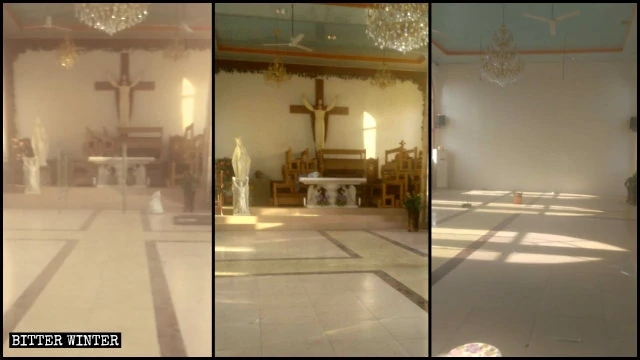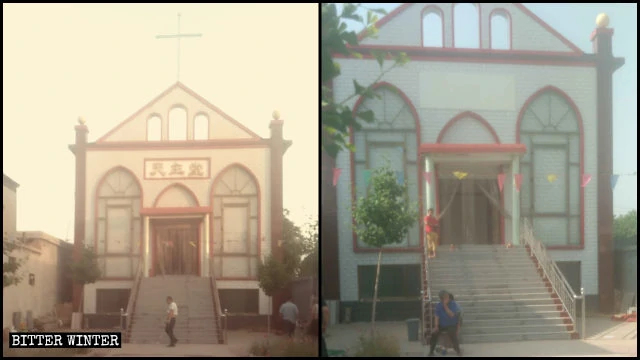Offering monetary rewards and praises, the CCP encourages communities to do away with religions to be named a “civilized village, town, or city.”
by Xin Lu
On May 29, members of an unregistered Catholic church in a village in Shijiazhuang, the capital of the northern province of Hebei, knelt crying in front of the church entrance under the scorching sun. They were hoping to prevent the church cross from being taken down as part of the village’s drive to be named “civilized.” All items from the church were removed already the day before. The congregation managed to save the cross for the time being, but local authorities threatened to “demolish it later on” and demanded the church director to sing an assurance not to hold gatherings.

The Chinese government uses the campaign of “civilized cities and villages” to set a societal model based on specific standards. Economic development and construction of “spiritual civilization” are generally used as selection criteria, and the existence of religious venues is regarded as a negative factor. To be named “civilized” and receive financial incentives and recognition from the government, authorities in localities must shut down places of worship, remove religious symbols, and reduce the number of people of faith. In short, it is yet another tool for the CCP to eliminate religions.

Last November, the Jinshui district’s government in Zhengzhou, the capital of the central province of Henan, punished shops that were selling Buddhist and Taoist merchandise on the grounds of “building a civilized city.” On November 18, about 20 officials from the Fengqing Road sub-district office carted away all statues of Buddha and Guanyin and other religious symbols from Yuanrong Tea City’s shops. They also removed the businesses’ signboards and banned their owners from burning incense and organizing other religious activities.
“Government officials said that no Buddhist merchandise should be found in a civilized city,” a shop owner told Bitter Winter. “Signboards are not allowed to contain Chinese characters for Buddha, incense, and feng shui.”
Another owner complained that government officials investigated his shop three times in a row, claiming that he was engaged in “feudal superstition by selling Buddhist statues.” Officials used similar claims during the Cultural Revolution, as all religions were regarded as “feudal superstition” and were suppressed.
In December 2018, Madao village in Henan’s Xinxiang city had its “civilized village” title revoked because one of its households receiving social subsidies posted religious couplets at home. A village resident recounted that officials were berating the family that the CCP, not God, was providing them with the financial aid. “The village Party secretary tore down the couplets and left in anger,” the villager remembered.
“The town government announced publicly that Madao village was named ‘civilized,’ ranking number one in Fengqiu county,” a local government employee told Bitter Winter. “But because of couple couplets, the 50,000 RMB [about $ 7,000] reward was canceled, and the village was ranked the last in the county.”
“A village can be named ‘advanced’ only if none of its residents have petitioned the government and were found to be religious for over a year,” a local government employee from the eastern province of Zhejiang explained. “While a village that has from three to five religious residents may be assessed as ‘backward.’ Officials from such villages must undergo specialized training twice a year. Therefore, local authorities try every possible means to pressure believers into signing statements renouncing their faith.”
A member of The Church of Almighty God from Zhejiang’s capital Hangzhou, who was arrested in 2012 for his belief, told Bitter Winter that officials had repeatedly compelled him to sign a statement to renounce his faith.
“The village Party secretary told me in September 2015 that higher authorities had promised to allocate 1.2 million RMB [about $ 172,000] to our village if it was named ‘civilized,’” the believer said. Since then, the secretary organized personnel to continually harass him and his family to make him renounce his faith. Knowing what was at stake, the man’s family and villagers started to oppose his belief. Because he didn’t want to give up his religion, the man decided to flee. The village committee offered a monetary reward for villagers to report on him to find and arrest him. The believer continues to live on the run.
Source: Bitter Winter












